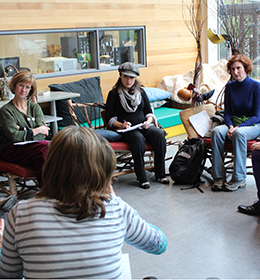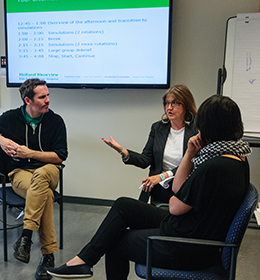
Editor’s Note: Congratulations to the Client & Family Centered Care Simulation Development Team at Holland Bloorview Kids Rehabilitation Hospital in Toronto, Ontario, one of two winners of this year’s Sherman Award for Excellence in Patient Engagement. They received the award at the National Patient Safety Foundation’s Patient Safety Congress in May 2017. The Sherman Award is co-sponsored by Taylor Healthcare and the Lucian Leape Institute at NPSF.
Abigail Arku-Matey is often the first person families speak with when they come to Holland Bloorview Kids Rehabilitation Hospital in Toronto, Ontario. Abigail, an appointment scheduler, believes every interaction she has with a client and family can impact their whole experience of care moving forward.
To support staff members like Abigail and others across the organization, Holland Bloorview offers an innovative simulation training program to help staff and students embed the core behaviors of client- and family-centered care (respect, information sharing, partnership and quality of care) into their day-to-day practice. Holland Bloorview, Canada’s largest children’s rehabilitation hospital for kids and youth with disabilities, was first among our healthcare peers to use simulation in this ground-breaking way.
Simulation is hands on and experiential, giving staff and students the opportunity to explore ways to improve their interactions and respond to different situations with clients and families in real time in a safe and supportive space.
Each of the four scenarios used in the simulation training is unique, with different background stories for the clients and families, who have a variety of questions and needs. Two of the scenarios are pre-recorded, with trained simulation actors portraying family and staff members, and two are live simulations in which staff and students roleplay with simulation actors from the Standardized Patient Program at the University of Toronto, which partners with the hospital to deliver the live simulations.
During each live simulation, staff and students have the opportunity to pause and discuss strategies about how best to support the clients and families. Likewise, following each pre-recorded simulation, staff and students have a debrief discussion to explore what is happening under the surface of the interactions and share and build on each other’s insights.
Abigail has been in her role at the hospital since 2013 and although she was confident in her ability to have respectful and compassionate interactions, she was eager to take the training to advance her skills. A couple of months after receiving the training, she felt she was listening more deeply to families to really understand their needs and as a result was able to better connect them with supports and services across the organization.
Her experience was similar to many of the nearly 450 staff and students who have participated in the simulation training to date. Recent participants have reported that the training has helped them prioritize relationships with clients and families and become more sensitive to their needs. Many have expressed that the training was an excellent vehicle for self-reflection and becoming more aware of their own biases. Asking families more open-ended questions to promote dialogue, picking up on non-verbal cues and being more patient are some of the other ways participants have put their learning into practice.
Simulations Developed in Partnership With Families
The simulation training, which was developed in partnership with families, is part of a full day orientation about client- and family-centered care. The training is one of many learning tools and resources Holland Bloorview provides to help staff and students successfully partner with clients and families to co-create the most effective and meaningful care. The hospital also offers regular education sessions about how to effectively partner with clients and families on committees and projects, integrate health literacy practices in care and de-escalate challenging situations.
At Holland Bloorview, client and family centered care drives everything we do. Our system-leading engagement framework ensures clients and families are full partners in decision-making at all levels of the organization, from care to strategic planning. Offering meaningful learning opportunities and supports for staff and students helps our organization continue to deepen our partnership with families and innovate new ways of engagement that drive positive change within our walls and beyond.
The simulation development team at Holland Bloorview was thrilled to receive the 2017 Sherman Award for Excellence in Patient Engagement for our simulation training. I am proud to be part of the development team that also includes: Amir Karmali, family centered-care specialist and family representative; Kimberley Siu-Chong, client and family relations facilitator; Darlene Hubley, interprofessional education leader; Laura Williams, former director, client and family integrated care; and Becky Quinlan, former family centered-care specialist and family representative. Also, this work would not be possible without Kerry Knickle, communication education specialist at Communication Matters, and her team of standardized patients.
This CFCC simulation work was made possible through a Fellowship from the AMS Phoenix Project.





